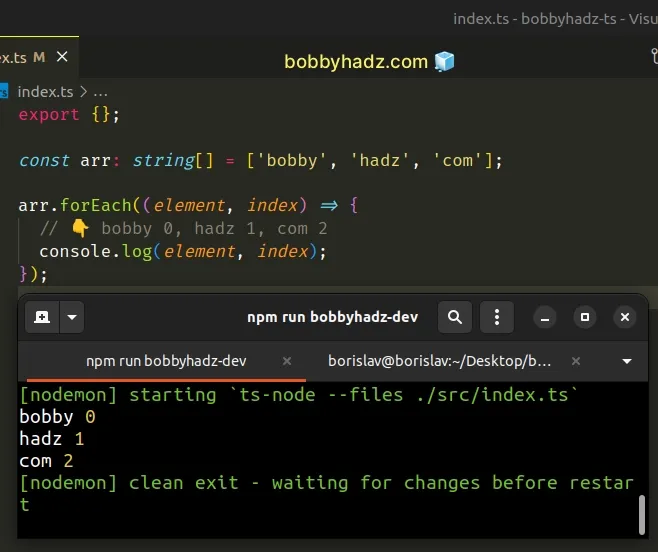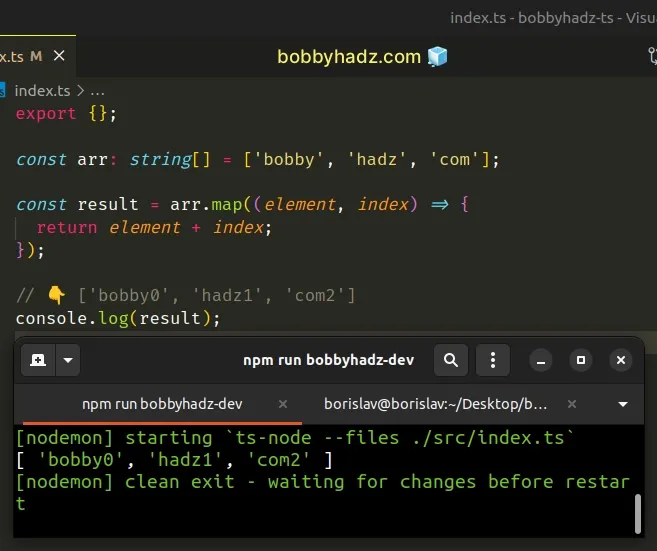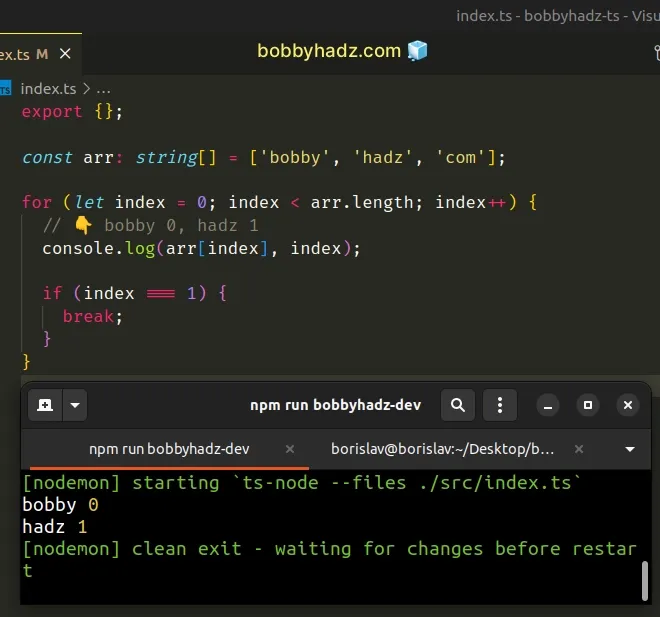Iterate over an Array or String with Index in TypeScript
Last updated: Feb 26, 2024
Reading time·3 min

# Table of Contents
If you need to iterate over a String with Index, click on the second subheading.
# Iterate over an Array with Index in TypeScript
Use the forEach() method to iterate over an array with access to the current
index.
The second parameter the callback function takes is the index of the element in the array.
const arr: string[] = ['bobby', 'hadz', 'com']; arr.forEach((element, index) => { // 👇️ bobby 0, hadz 1, com 2 console.log(element, index); });

The function we passed to the Array.forEach method gets called with each element in the array.
The callback function gets passed the following 3 parameters:
- The current
elementin the array. - The
indexof the element in the array. - The
arrayon which theforEach()method was called.
The forEach() method returns undefined, so it is used to mutate an external
variable.
# Iterate over an Array with Index using map()
If you need to loop over the array with an index but return a value on each iteration, use the Array.map method instead.
const arr: string[] = ['bobby', 'hadz', 'com']; const result = arr.map((element, index) => { return element + index; }); // 👇️ ['bobby0', 'hadz1', 'com2'] console.log(result);

The function we passed to the map() method gets called with each element in
the array and gets passed the same parameters as forEach().
map() method returns a new array containing the elements we returned from the callback function.# Iterate over an Array with Index using a for loop
An important thing to note when using the forEach() method is that you can't
use the break keyword to break out of the loop.
If you have to use the break keyword to exit the loop if a condition is met,
use a basic for loop instead.
const arr: string[] = ['bobby', 'hadz', 'com']; for (let index = 0; index < arr.length; index++) { // 👇️ bobby 0, hadz 1 console.log(arr[index], index); if (index === 1) { break; } }

A basic
for
loop is not as elegant as using forEach(), however, it enables us to use the
break keyword to exit the loop once a condition is met.
# Iterate over a String with Index in TypeScript
If you need to iterate over a string with index:
- Use the spread syntax (...) to unpack the string into an array.
- Use the
forEach()method to iterate over the array. - The second parameter the
forEach()method takes is the index of the current element.
const str = 'hello'; const arr: string[] = [...str]; console.log(arr); // 👉️ ['h', 'e', 'l', 'l', 'o'] arr.forEach((char, index) => { // 👇️ h 0, e 1, l 2, l 3, o 4 console.log(char, index); });
We used the spread syntax (...) to unpack the string into an array.
The array contains all of the characters in the string as elements.
The function we passed to the Array.forEach method gets called with each
element in the array.
The callback function gets passed the following 3 parameters:
- The current
elementin the array. - The
indexof the element in the array. - The
arrayon which we called theforEach()method.
# Iterate over a String with Index using a for loop
An important thing to note when using the forEach() method is that you can't
use the break keyword to break out of the loop.
If you have to use the break keyword to break out of the loop if a condition
is met, use a basic for loop instead.
const str = 'hello'; for (let index = 0; index < str.length; index++) { // 👇️ h 0, e 1, l 2 console.log(str[index], index); if (index === 2) { break; } }
The break keyword enables us to exit the loop early and is not supported when
using the forEach() method.
Other than that, the for loop is a little more verbose and is used less often
in the real world as the language offers more abstractions on top of it.

